Ellakiwale
On this page, you find all documents, package deals, and flashcards offered by seller ellakiwale.
- 121
- 0
- 0
Community
- Followers
- Following
3 Reviews received
121 items
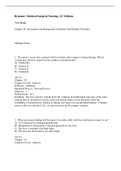
Chapter 39: Assessment and Management of Patients With Hepatic Disorders: Medical-Surgical Nursing, 11th Edition Test Bank
Multiple Choice 1. The nurse is aware that a patient with liver failure often requires vitamin therapy. Which vitamin does the liver require for the synthesis of prothrombin? A) Vitamin B12 B) Vitamin A C) Vitamin D D) Vitamin K Ans: D Chapter: 39 Cognitive Level: Analysis Difficulty: Moderate Integrated Process: Nursing Process Objective: 1 Patient Needs: D-2 Feedback: The liver requires vitamin K for the synthesis of prothrombin and some of the other clotting factors. Breakdown ...
- Exam (elaborations)
- • 15 pages •
Multiple Choice 1. The nurse is aware that a patient with liver failure often requires vitamin therapy. Which vitamin does the liver require for the synthesis of prothrombin? A) Vitamin B12 B) Vitamin A C) Vitamin D D) Vitamin K Ans: D Chapter: 39 Cognitive Level: Analysis Difficulty: Moderate Integrated Process: Nursing Process Objective: 1 Patient Needs: D-2 Feedback: The liver requires vitamin K for the synthesis of prothrombin and some of the other clotting factors. Breakdown ...
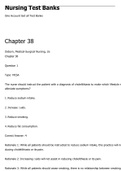
Chapter 38 Osborn, Medical-Surgical Nursing, 2e
Question 1 Type: MCSA The nurse should instruct the patient with a diagnosis of cholelithiasis to make which lifestyle modification to alleviate symptoms? 1. Reduce sodium intake. 2. Increase fluids. 3. Reduce smoking. 4. Reduce fat consumption. Correct Answer: 4 Rationale 1: While all patients should be instructed to reduce sodium intake, this practice will not assist in reducing cholelithiasis or its pain. Rationale 2: Increasing fluids will not assist in reducing cholelithiasis or i...
- Exam (elaborations)
- • 37 pages •
Question 1 Type: MCSA The nurse should instruct the patient with a diagnosis of cholelithiasis to make which lifestyle modification to alleviate symptoms? 1. Reduce sodium intake. 2. Increase fluids. 3. Reduce smoking. 4. Reduce fat consumption. Correct Answer: 4 Rationale 1: While all patients should be instructed to reduce sodium intake, this practice will not assist in reducing cholelithiasis or its pain. Rationale 2: Increasing fluids will not assist in reducing cholelithiasis or i...
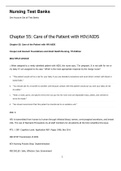
Chapter 55: Care of the Patient with HIV/AIDS
MULTIPLE CHOICE 1. When assigned to a newly admitted patient with AIDS, the nurse says, “I’m pregnant. It is not safe for me or my baby if I am assigned to his case.” Which is the most appropriate response by the charge nurse? a. “This patient would not be a risk for your baby if you use standard precautions and avoid direct contact with blood or body fluids.” b. “You should ask for a transfer to another unit because contact with this patient would put you and your baby at risk ...
- Exam (elaborations)
- • 21 pages •
MULTIPLE CHOICE 1. When assigned to a newly admitted patient with AIDS, the nurse says, “I’m pregnant. It is not safe for me or my baby if I am assigned to his case.” Which is the most appropriate response by the charge nurse? a. “This patient would not be a risk for your baby if you use standard precautions and avoid direct contact with blood or body fluids.” b. “You should ask for a transfer to another unit because contact with this patient would put you and your baby at risk ...
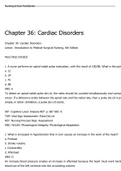
Chapter 36: Cardiac Disorders: Introduction to Medical-Surgical Nursing, 6th Edition
MULTIPLE CHOICE 1. A nurse performs an apical-radial pulse evaluation, with the result of 100/88. What is the pulse deficit? a. 12 b. 24 c. 76 d. 88 ANS: A To detect an apical-radial pulse deficit, the rates should be counted simultaneously and compared for differences. If a difference exists between the apical rate and the radial rate, then a pulse deficit is present. For example, in atrial fibrillation, a pulse deficit exists. DIF: Cognitive Level: Analysis REF: p. 687 OBJ: 8 TOP: Vit...
- Exam (elaborations)
- • 15 pages •
MULTIPLE CHOICE 1. A nurse performs an apical-radial pulse evaluation, with the result of 100/88. What is the pulse deficit? a. 12 b. 24 c. 76 d. 88 ANS: A To detect an apical-radial pulse deficit, the rates should be counted simultaneously and compared for differences. If a difference exists between the apical rate and the radial rate, then a pulse deficit is present. For example, in atrial fibrillation, a pulse deficit exists. DIF: Cognitive Level: Analysis REF: p. 687 OBJ: 8 TOP: Vit...
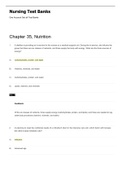
Chapter 35, Nutrition
1. A dietitian is providing an in-service for the nurses on a medical-surgical unit. During the in-service, she informs the group that there are six classes of nutrients, and three supply the body with energy. What are the three sources of energy? A) Carbohydrates, protein, and lipids B) Vitamins, minerals, and water C) Carbohydrates, protein, and water D) Lipids, vitamins, and minerals Ans: A Feedback: Of the six classes of nutrients, three supply energy (carbohydrates, protein, and li...
- Exam (elaborations)
- • 20 pages •
1. A dietitian is providing an in-service for the nurses on a medical-surgical unit. During the in-service, she informs the group that there are six classes of nutrients, and three supply the body with energy. What are the three sources of energy? A) Carbohydrates, protein, and lipids B) Vitamins, minerals, and water C) Carbohydrates, protein, and water D) Lipids, vitamins, and minerals Ans: A Feedback: Of the six classes of nutrients, three supply energy (carbohydrates, protein, and li...
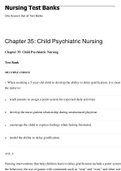
Chapter 35: Child Psychiatric Nursing
MULTIPLE CHOICE 1. When assisting a 5-year-old child to develop the ability to delay gratification, it is most valuable for the nurse to: a. teach parents to assign a point system for expected daily activities. b. develop the nurse-patient relationship during unstructured playtime. c. encourage the child to express feelings when feeling frustrated. d. model the ability to delay gratification. ANS: A Nursing interventions that help children learn to delay gratification include a point sys...
- Exam (elaborations)
- • 19 pages •
MULTIPLE CHOICE 1. When assisting a 5-year-old child to develop the ability to delay gratification, it is most valuable for the nurse to: a. teach parents to assign a point system for expected daily activities. b. develop the nurse-patient relationship during unstructured playtime. c. encourage the child to express feelings when feeling frustrated. d. model the ability to delay gratification. ANS: A Nursing interventions that help children learn to delay gratification include a point sys...
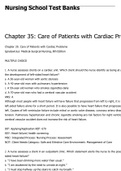
Chapter 35: Care of Patients with Cardiac Problems : Medical-Surgical Nursing, 8th Edition
MULTIPLE CHOICE 1. A nurse assesses clients on a cardiac unit. Which client should the nurse identify as being at greatest risk for the development of left-sided heart failure? a. A 36-year-old woman with aortic stenosis b. A 42-year-old man with pulmonary hypertension c. A 59-year-old woman who smokes cigarettes daily d. A 70-year-old man who had a cerebral vascular accident ANS: A Although most people with heart failure will have failure that progresses from left to right, it is possib...
- Exam (elaborations)
- • 15 pages •
MULTIPLE CHOICE 1. A nurse assesses clients on a cardiac unit. Which client should the nurse identify as being at greatest risk for the development of left-sided heart failure? a. A 36-year-old woman with aortic stenosis b. A 42-year-old man with pulmonary hypertension c. A 59-year-old woman who smokes cigarettes daily d. A 70-year-old man who had a cerebral vascular accident ANS: A Although most people with heart failure will have failure that progresses from left to right, it is possib...
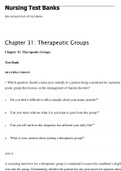
Chapter 31: Therapeutic Groups
MULTIPLE CHOICE 1. Which question should a nurse pose initially to a patient being considered for inclusion into a therapeutic group that focuses on the management of bipolar disorder? a. “Do you find it difficult to talk to people about your manic periods?” b. “Can you share with me what it is you hope to gain from this group?” c. “Can you tell me how this diagnosis has affected your daily life?” d. “What is your opinion about joining a therapeutic group?” ANS: D A screen...
- Exam (elaborations)
- • 17 pages •
MULTIPLE CHOICE 1. Which question should a nurse pose initially to a patient being considered for inclusion into a therapeutic group that focuses on the management of bipolar disorder? a. “Do you find it difficult to talk to people about your manic periods?” b. “Can you share with me what it is you hope to gain from this group?” c. “Can you tell me how this diagnosis has affected your daily life?” d. “What is your opinion about joining a therapeutic group?” ANS: D A screen...
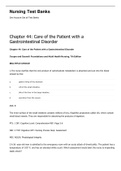
Chapter 44: Care of the Patient with a Gastrointestinal Disorder
MULTIPLE CHOICE 1.The nurse clarifies that the end product of carbohydrate metabolism is absorbed and put into the blood stream by the: a. gastric lining of the stomach. b. villi of the small intestine. c. bile of the liver in the large intestine. d. excretion from the cecum. ANS: B The inner surface of the small intestine contains millions of tiny, fingerlike projections called villi, which contain small blood vessels. They are responsible for absorbing the products of digestion. PTS:...
- Exam (elaborations)
- • 24 pages •
MULTIPLE CHOICE 1.The nurse clarifies that the end product of carbohydrate metabolism is absorbed and put into the blood stream by the: a. gastric lining of the stomach. b. villi of the small intestine. c. bile of the liver in the large intestine. d. excretion from the cecum. ANS: B The inner surface of the small intestine contains millions of tiny, fingerlike projections called villi, which contain small blood vessels. They are responsible for absorbing the products of digestion. PTS:...
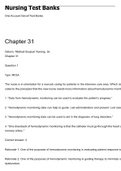
Chapter 31 Osborn, Medical-Surgical Nursing, 2e
Question 1 Type: MCSA The nurse is in orientation for a new job caring for patients in the intensive care area. Which statement indicates to the preceptor that the new nurse needs more information about hemodynamic monitoring? 1. “Data from hemodynamic monitoring can be used to evaluate the patient’s progress.” 2. “Hemodynamic monitoring data can help to guide fluid administration and prevent fluid overload.” 3. “Hemodynamic monitoring data can be used to aid in the diagnosis of...
- Exam (elaborations)
- • 36 pages •
Question 1 Type: MCSA The nurse is in orientation for a new job caring for patients in the intensive care area. Which statement indicates to the preceptor that the new nurse needs more information about hemodynamic monitoring? 1. “Data from hemodynamic monitoring can be used to evaluate the patient’s progress.” 2. “Hemodynamic monitoring data can help to guide fluid administration and prevent fluid overload.” 3. “Hemodynamic monitoring data can be used to aid in the diagnosis of...

Chapter 06: Care of the Patient with a Gallbladder, Liver, Biliary Tract, or Exocrine Pancreatic Disorder
Chapter 46. Nursing Care of Patients With Musculoskeletal and Connective Tissue Disorders
Foundations Of Nursing 6th Edition by Barbara Lauritsen Christensen – Test Bank